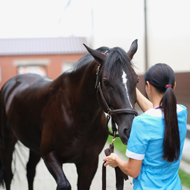RSPCA centre sees increase in FPV cases
RSPCA is seeing an increase in stray cats at its centres, including Nyx.
The Royal Society for the Prevention of Cruelty to Animals (RSPCA) has warned of a concerning increase in Feline Panleukopenia Virus (FPV) cases among its intake of cats.
The RSPCA Newbrook Farm Animal Hospital, in Birmingham, reports a significant increase in cats from Birmingham and Coventry which are diagnosed with FPV.
FPV is a severe and highly contagious disease, similar to the parvovirus in dogs. The aggressive nature of the disease means that sudden death is not uncommon, with many cats, especially kittens, being euthanised to prevent suffering.
Among the symptoms of FPV are a loss of appetite, a high fever, vomiting, diarrhoea and lethargy.
The RSPCA attributes the increase in cases to a lack of vaccinations among cats. Cat owners are being urged to vaccinate their pets against the disease, as well as keeping up with their booster jabs.
Statistics from the PDSA PAW Report 2024 revealed that only 65 per cent of cats in the UK were receiving their regular booster vaccinations. This is not enough to be maintaining herd immunity.
Similarly, the RSPCA has highlighted the importance of neutering in managing disease transmission.
The charity says that managing overpopulation this way is vital, as many charities are seeing a significant increase in cat and kitten intakes. This increases the risk of diseases transmission among the feline community.
Jo Szkutnicki, RSPCA Newbrook Hospital director, said: “This is putting a huge strain on our resources and very sadly, these poor animals cannot always be saved,
“We would urge owners to do their bit to help - by vaccinating their cats and ensuring they receive regular, timely boosters to prevent these unnecessary illnesses. We’d also urge veterinary practices to spread the message about the importance of vaccinations so that we can all help tackle this together.”
Image © RSPCA



 The BEVA has opened two new roles on its Nurse Committee.
The BEVA has opened two new roles on its Nurse Committee.